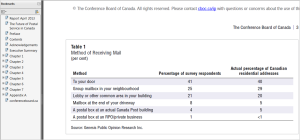As discussed here, and here, the folks on the CivicAccess.ca list are doing some digging into the numbers behind this Canada post announcement to cancel home delivery of the mail. In addition, Armine Yalnizyan’s Globe and Mail Article Canada Post’s vow to ‘protect taxpayers’ needs a reality check which questions the validy of reported losses in financial reports. As part of that digging some of the following links are being made. And of course the following National Post Article Canada Post CEO Deepak Chopra is a board member of the think-tank that urged mail changes revealed that:
Chopra is also paid the highest salary range among so-called governor-in-council cabinet appointments, with potential earnings of more than half a million dollars a year as Canada Post CEO. Chopra is paid at the CEO 8 level, meaning he receives between $440,900 and $518,600 a year in salary to head an organization that has nearly two dozen presidents and vice-presidents.
Here are some findings about the CEO, his relationship with the Conference Board of Canada and also with Pitney and Bowes which runs a private sector mail service:
- The CEO of Canada Post is also a board member of the Conference Board of Canada who produced the report recommending the cancelation of home mail delivery
- The CEO’s Bio recognizes him for having:
reorganized the postal business into two distinct business units: a Physical Delivery Network, which offers highly competitive mail and parcel delivery to every household; and a Digital Delivery Network, which is responsible for the epost electronic delivery solutions, online properties and consumer experience while supporting the Direct Marketing industry with location data analytics.
- He was also “President and Chief Executive Officer of Pitney Bowes Canada and Latin America”
- Pitney and Bowes, sell mailing software and mail metering services. They also have mail meters and scales, mail sorters, mail room printers and of course shipping services. They have contracts with Canada post. It seems that if a company uses this service they can get mail cost rebates, and it also seems that they are running target mailing services and a parallel mail service to the post office. They of course are ahead of the curve when it comes to the rate hikes, and have alerts available to their clients on how to modify the software attached to their mail metering hardware.
The report, L’Avenir du service postal au Canada / The Future of the Postal Service included some numbers and references to some interesting data shops as follows:
- The econometric analysis discussed in chapter 1 of this report was done by ZenithOptiMedia is also a media agency with shops in Toronto and Montreal. The algorithms were not provided nor the data sources. It is a big data analytical shop
- Dunn and Bradsheet supplied some corporate data. According to them, they are “the world’s leading source of commercial information and insight on businesses”. They also do credit scores.
- Genesis Public Opinion Research Inc did the public opinion research. Not much is available about this company, they do however have a standing offer with the Government of Canada to do this this type of research. And if this link to them is correct they are a shop based in Chelsea, QC with one employee? s http://www.salespider.com/b-143469756/genesis-public-opinion-research-inc, one employee?
The data from which it was decided that Canada Post should change its direction was not provided in the report, the following was:
- “The target sample included approximately 500 customers who get mail delivered to their door (DTD), 300 who use group mailboxes (CMB), 250 who receive mail in their lobby or common area (LBA), 100 who have mail delivered to the end of their driveways (RMB), and 60 who have postal boxes in Canada Post or private buildings (DFLB). This roughly mirrors the current distribution of customers by delivery category, with an oversample of rural driveway customers”.
- “A total of 1,212 residential customers, 18 years of age or older, were surveyed by telephone from September 26 to October 10, 2012. The results are considered accurate to within +/- 2.8 per cent, 19 times in 20.”
- “Genesis explored the views of small businesses through a two-stage process. The first stage was a series of five focus groups, held in Moncton, Montréal, Mississauga, Brandon, and Calgary. The second stage involved a telephone survey of individuals in small businesses who make decisions on postal products and services within their company.”
- “The interviews were conducted with 800 businesses selected randomly from among a nationwide pool of businesses with more than 1 but fewer than 100 employees. The sample was generated using data from Dunn and Bradstreet. The source data for the sample were stratified by employee size, region, and Standard Industrial Classification (SIC). Only businesses with 2 to 100 fulltime employees were eligible for inclusion in the final sample. The sample was then randomly drawn from businesses across the full range of over 1,000 SIC codes, but it excluded Canada Post, print and electronic media, hospitals, educational institutions, and all three levels of government”.
To summarize, this unbiased report was produced by an organization, who has as its board member, the proponent of the research who also happens to be the CEO of the Crown Corporation which is proposing the radical changes, furthermore, this CEO was also the president and CEO of a company that has a private sector mail service that may benefit from these changes, and he is paid close to 520K per year by the Crown / governor in council who appointed him, of an organization that is fasely reporting losses. In addition the data sources and algorithms behind the reports are not made available, while the sampling of the population is small and primarily urban and even these small numbers were also misreported.
Maybe it is just me, but it would seem that something is a little off here. And, there seems to be a pattern, the cancelation of the census in 2010 was announced just before the summer holidays, the cancelation of home delivery of the post was announced just before the Xmas holidays of 2013, and we have a Prime Minister who seems to have an aversion to evidence based decision making.
It would be good to know who stands to gain with this Canada Post decision, a quick glance tells me that the Canada Post Digital Delivery Network, Direct Marketing industry with location data analytics gain, and that would include companies like Pitney and Bowes, while the Physical Delivery Network which is the one that serves the public, loses.


Comments on Posts